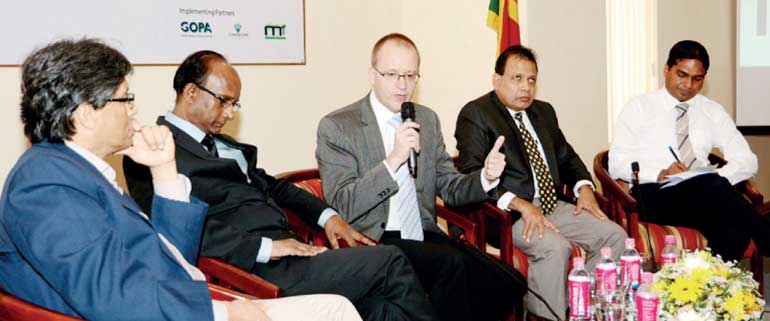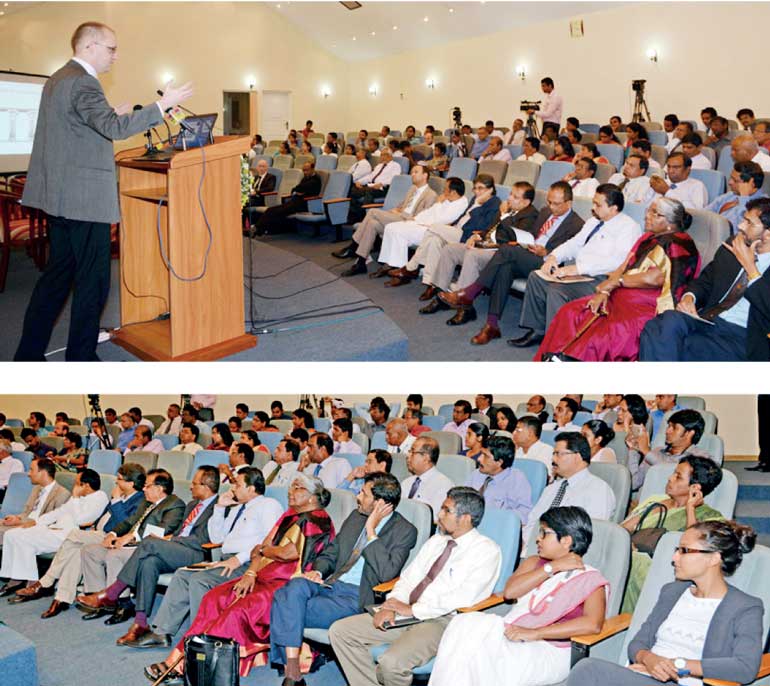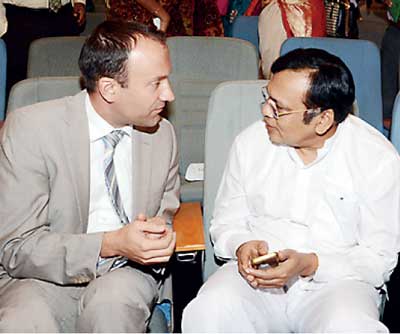Saturday Feb 21, 2026
Saturday Feb 21, 2026
Thursday, 17 December 2015 00:17 - - {{hitsCtrl.values.hits}}


 The SME sector is recognized as the backbone of the economy in the country and it accounts for more than 90% of the enterprises in the country and contributing 52% to the GDP. The government has decided to give priority for the development of the SME sector in the country with the objective of improving the economy and provision of employment.
The SME sector is recognized as the backbone of the economy in the country and it accounts for more than 90% of the enterprises in the country and contributing 52% to the GDP. The government has decided to give priority for the development of the SME sector in the country with the objective of improving the economy and provision of employment.
The German Government has assisted the Sri Lankan Government in many facets in developing the SME sector in Sri Lanka and one such intervention is the University Business Linkage (UBL) Programme executed under the patronage of the University Grants Commission of Sri Lanka and University of Leipzig, Conoscope and GOPA consultants of Germany. Under this programme, it is expected to bring together Universities, National and Regional Chambers, corporate players and local SMEs together and to establish close linkages. The focus at present is on the Eastern, Northern and Uva Provinces which are identified as regions in need of further development. The programme is implemented in Uva Wellasa, Southern Eastern, Eastern and Jaffna University together with the University of Moratuwa as a steering partner.
The universities are working very closely with industries/business in many countries conducting joint research and development work, providing internships for students, sponsoring students and their individual research and many activities beneficial to both parties. In this porgramme it is expected to identify the needs of the Sri Lankan SMEs and the private sector and to develop UBL programme suitable to our country learning through some of the best practices in the world.
The GIZ-UBL programme is based on an initial study carried out by the Deutsche Gesellschaft für Internationale Zusammenarbeit (GIZ) GmbH and the programme offered is of 16 months duration which will be executed with close involvement of the University Grants Commission. The technical input is provided through the international German consultancy firm GOPA and Conoscope as well as Univ of Leipzig, Germany, where as the local component and coordination work is carried out by the Multi Tech Solutions (Pvt) Ltd. In each university a UBL team consisting of senior academics has been formed and a coordinators was also appointed to coordinate the activities under the UBL programme.
The international consultants had a series of meetings with the relevant stake holders such as Industry, chambers, trade association, Ministry of Higher Education and University grants commission. Initial awareness programmes and a round of workshops were held in each university including academic staff, Chamber and representatives from trade associations.
National Event
The first national event on this programme will be held on 1 November from 3.00 pm to 5.30 pm at Lakshman Kadirgamar Institute of International Relations and Strategic Studies with the patronage of the Hon. Minister of Higher Education and Highways, Hon. Deputy Minister of Higher Education, Distinguished invitees representing the Treasury, University Grants Commission, Vice Chancellors and Senior officials of the GIZ, National and Regional Chambers and UBL team members of the Universities.
The theme of the national event is “Towards a Promotive University-Business Linkage System in Sri Lanka”. The Government policy and the objective of developing linkages between the SMEs and the Universities aiming at a productive
and sustainable SME sector is expected to be discussed at this event. The Keynote speaker Professor Utz Dorenberg, University of Leipzig, Germany will be speaking on the topic “Fostering University Business Linkages — International
Examples”. The Chief Executive Officer of the Ceylon Chamber of Commerce Mr. Mangala P.B Yapa will be speaking on the experiences on linkages with the Universities and the present needs of the industry in this context. There will be a lively interactive session on exchange of good practices, successful models practiced in other countries and developing a suitable UBL model to our country.
Pix by Pradeep pathirana